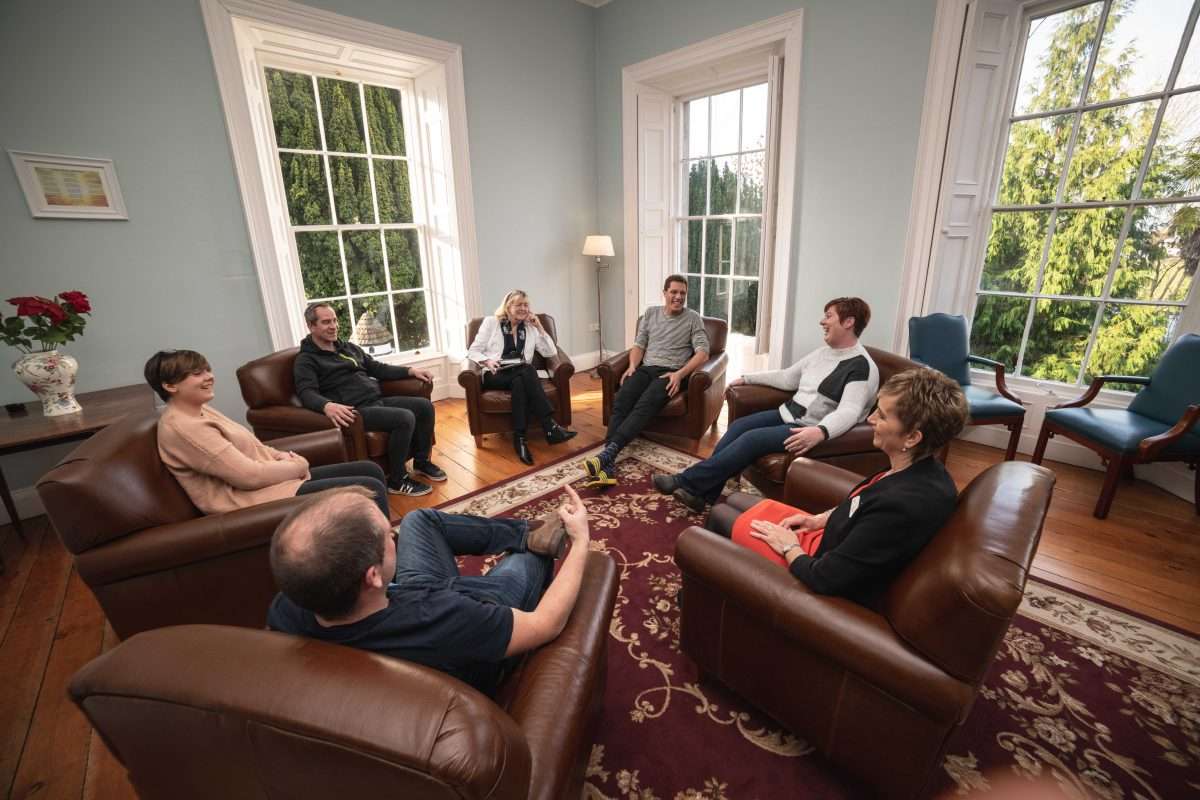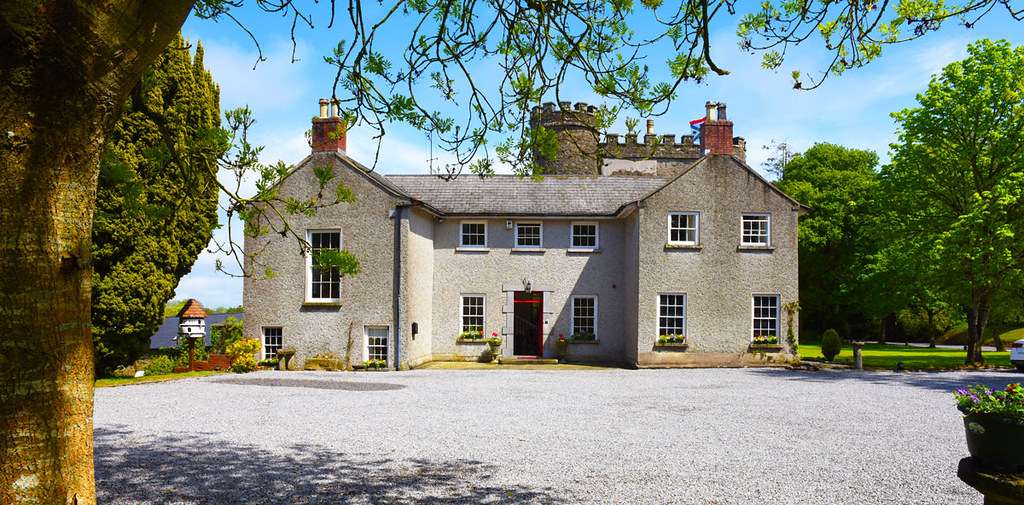
Rediscover Who You Are
Table of Contents
Interventions With a Loved One
An intervention is a carefully planned process organised by friends and family members, or a professional such as a licensed alcohol and drug counsellor or interventionist. It is designed to encourage a friend or family member struggling with alcohol or drug addiction, to seek help.

Download our Brochure
Addiction interventions can be overwhelming, emotional and some may even get heated. It’s important that this subject is broached in the right way to avoid isolating the person you are trying to help.
The best outcome you can hope for from an intervention is that the person agrees to addiction treatment. However, you must also prepare for the fact that the person struggling could still be in denial, which may result in them lashing out or becoming angry.
By being empathetic and non-judgmental towards your loved one, you can improve your chances of the intervention being successful. It is an opportunity to let your friend or family member know that you care about them and are deeply concerned about their well-being.

Why Do People Choose an Intervention?
Many people suffering from alcoholism and drug dependence are in denial about the reality of their problem. Loved ones struggle to watch the person they care about to continue down such a destructive path. Very often they feel as though staging an intervention is their only hope.
There are many types of intervention styles. Some people choose to bring in a qualified interventionist to lead the intervention. Others opt to keep it between family and friends.
Free & Confidential Addiction Assessment
Taking the first step in seeking help can be very difficult, our team is here to help you.
The Benefits of Staging an Intervention
It is carefully planned
An addiction intervention can be carefully planned, which means there is less chance of family members feeling unprepared. A poorly planned intervention can derail the process completely. Family and friends can discuss what they want to say beforehand and prepare themselves for any potential pushback.
Organising an intervention group can help ease any feelings of stress and anxiety. The more familiar faces present may increase the chances of motivating a loved one to seek treatment.
It’s a Chance for Loved Ones to Express Their Feelings
Family members may find it beneficial to openly share their feelings about their loved one’s addiction. Addiction is a lonely place for the person suffering, but it can also be difficult for those around them who don’t know what to do for the best.
They Can Go Straight to Treatment
If you’re staging an intervention using an intervention specialist, then treatment can be pre-arranged. This allows the person struggling to go straight to a treatment facility and begin their addiction recovery before they have the opportunity to change their mind.
You Can Set Boundaries
Very often, families feel as though intervention is their last hope. They use this as an opportunity to let their loved one know that they are no longer able to put up with their alcohol or substance misuse. Setting boundaries in this way can let the person know that the situation is serious and may force them to consider attending a treatment facility.

Reaching Out
“Staging an intervention is a demonstration of love.”
An intervention is a proactive step towards healing a loved one and their family. Addiction is a family illness. It touches and affects everyone that comes into contact with it. Non-medical interventions are sadly very common when friends or family confront a person’s drinking or drug misuse and ask them to stop. Often it can descend into chaos with no one being heard or understood.
Interventions are a completely individual process and should be planned as such. Our services are bespoke and tailored to your family’s needs.
Our Intervention Process
Interventions are arranged through our sister clinic, CATCH Recovery London. You can contact our team at Smarmore who will help you start the process and connect you with the right people. Alternatively, you can contact CATCH directly and they will advise you on the next steps.
Initial Stage of Intervention
A member of our team will take your inquiry
You will undergo a brief assessment of the nature of your intervention needs. They will ask for the following information:
a) Background on the addiction
b) The nature of the intervention services needed, for example, in-person or telehealth
c) The person’s mental health history and any medication they are taking
Duties During Intervention
Our team can assist with any administration and coordination between interventionists and participants of the intervention.
After Intervention
If a person agrees to enter treatment
a) We will connect you with the admissions team at Smarmore Castle for an assessment and clinical decision
b) We can assist with gathering any additional information requested by the clinical team.
c) If admission is approved, we will coordinate with the team on the admission date
d) We can transport them to Smarmore Castle, Ireland without delay if Smarmore accepts immediate admission
e) We can arrange travel with a Sober Companion directly to Smarmore Castle, Ireland via car or aeroplane if you live abroad; we can also have CATCH arrange for a Sober Companion to stay with them at their house until Smarmore Castle is ready to admit them
If the person does not agree to an addiction treatment program
a) We will follow up with the group or primary contact of intervention once every two weeks to see how things are progressing or if the person has changed their mind
If the patient wishes to go elsewhere
a) We have a list of options available in agreement with the interventionist
Intervention Methods
Often, an intervention serves as the first step to recovering from their alcoholism just by becoming aware of the issue. A professional interventionist might use various models of intervention to motivate a loved one into treatment. There are four major models in use today: the Johnson Model, the Arise Model, the RAAD Model and the Family Model.
The Johnson Model of Intervention
This model is focused on the belief that someone suffering from addiction requires support when it comes to seeking treatment and aims to also motivate them to complete their treatment plan.
This method of intervention was developed by Dr. Vernon Johnson in the 1970s. He saw the value that family and friends could bring to interventions. This model changed the way people approached individuals suffering from addiction and encouraged a more caring and encouraging approach to interventions.
The Family-Centric Approach
The original intervention protocol, the Johnson Model, does carry an element of surprise – as family members confront the person directly about the damage their drinking or drug use has caused. Members of the addict’s social network state in clear terms the consequences that will happen if treatment is refused.
Many interventionists, including Scherer, prefer a more non-confrontational approach that puts the entire family in recovery.

Download our Brochure
Crisis Intervention
A crisis intervention is an immediate and short-term emergency response to a person struggling mentally, emotionally or experiencing some kind of behavioural distress as a result of substance misuse or serious mental illness. Crisis interventions are designed to help minimise any further trauma or distress.
These interventions are often carried out by intervention specialists or an intervention team in a clinic, addiction treatment centre or a person’s home. While crisis counselling is an effective short-term solution, it is not designed to provide in-depth psychological treatment.
Arise Intervention
Addiction is a disease that affects entire families and anyone else close to the person. With this in mind, ARISE interventions are designed to help family members as well as those struggling with addiction. It gives the family a chance to play an active role in the recovery process and share their feelings about their loved one’s addiction, as well as the opportunity to help heal the family dynamic.
The intervention aims to make the person understand how their drug misuse or alcoholism is affecting their life and the lives of those around them. The next step is to help them recognise that addiction treatment is the most effective way to addiction recovery.
Quick Assessment & Admissions

Getting the Person Help
Using Smarmore Castle’s qualified interventionists can help your loved one get the addiction treatment they need and improve their chances of achieving long-term recovery.
Finding a solution to the endless cycle of watching someone you love suffering from substance misuse or mental health disorders is what an intervention is all about.
There are many different methods, whether you prefer to try the ARISE intervention method or the Johnson Model. Our qualified interventionists will explain everything you need to help you make a decision and support you every step of the way.